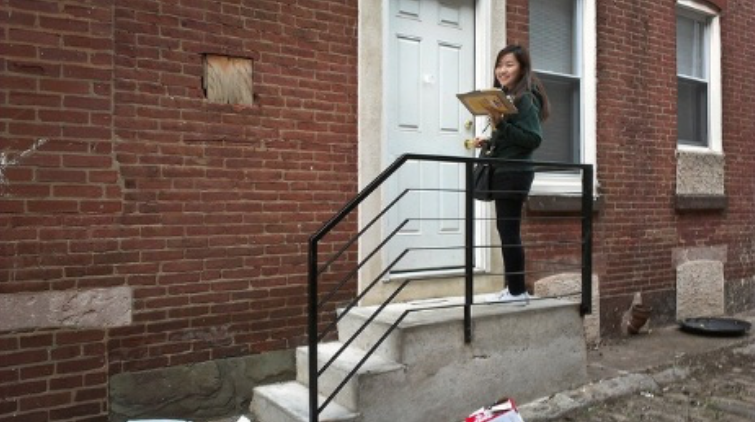CommentsWORDS OF WARNING-In the near future, you may see an increase in people in your towns going door-to-door to strike up conversations with residents.
These politically engaged folks are actively pursuing votes for their candidates of choice, a time-honored tradition since the founding of the republic. With Labor Day passed and Election Day in the near future, all political parties will be ramping up their get-out-the-vote (GOTV) efforts.
Your inclination may be to restrict this activity, or to enforce an old, outdated ordinance that requires such canvassers to first jump through any number of hoops, like giving police advance notice or fingerprinting people who will be doing the canvassing or forcing canvassers to pay a fee or to provide a criminal background check. Here at the ACLU of Pennsylvania, we’ve already received complaints that some municipalities in the commonwealth have been doing just that, including in Lackawanna, Beaver, Delaware, and Bucks counties.
Our advice to you, as leaders of local government in Pennsylvania, is simple: Don’t do it. The Supreme Court of the United States has been clear on this point. Governments cannot restrict people from going door-to-door for noncommercial purposes between the hours of 9 a.m. and 9 p.m. “Noncommercial” includes people who will be trying to convince residents of your towns to vote for their preferred candidate.
In 2002, the U.S. Supreme Court ruled that a municipal ordinance prohibiting any “canvassers, solicitors, peddlers, hawkers, itinerant merchants or transient vendors” from “going in and upon private property … without first registering in the office of the Mayor and obtaining a Solicitation Permit” was overbroad and violated the First Amendment’s free-speech guarantees in a case called Watchtower Bible & Tract Society v. Village of Stratton. Your solicitor might want to check it out. It was an 8–1 decision; it wasn’t even close.
In 2006, the ACLU won a lawsuit on behalf of political GOTV canvassers who challenged a municipal pre-registration requirement. In Service Employees International Union v. Municipality of Mt. Lebanon, the U.S. Third Circuit Court of Appeals declared that even a minimally burdensome “registration,” or advance-notice, requirement prior to people canvassing door-to-door violates the First Amendment.
By the way, that lawsuit cost the borough of Mount Lebanon in Allegheny County $65,000 in litigation fees and costs, which is typical in civil rights cases.
The only people who can stop canvassers from coming to their doors are the residents themselves, who can legally post “no soliciting” signs on their property.
When the government respects people’s constitutional rights, everyone wins. But, if necessary, the ACLU of Pennsylvania has no qualms about protecting the First Amendment rights of people who want to express themselves politically by talking with the residents of your towns about the upcoming election. If your police department tries to prohibit someone from going door-to-door, that person is welcome to contact us at this link.
Hopefully it won’t come to that. This memo and this FAQ should give you all of the guidance you need. You took an oath to uphold the constitution. We expect you to honor it.
Sincerely,
The team at the ACLU of Pennsylvania
(The ACLU’s Pennsylvania affiliate defends the Constitution and the Bill of Rights through litigation, advocacy, and community education and outreach.) Prepped for CityWatch by Linda Abrams.















